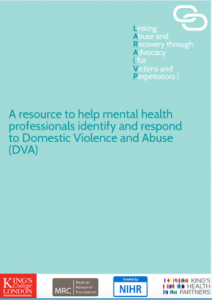Over the past year, the Section of Women’s Mental Health at King’s College London have been developing an online online resource about domestic abuse for mental health professionals and services. This resource, dubbed “LARA-VP”, has now been published online and is available to download for free using the link on the left click here
The LARA-VP resource is an update of a resource developed for the original LARA domestic abuse intervention for mental health services. It has been informed by recent evidence and clinical guidelines, as well as feedback from relevant stakeholders including academics, clinicians, survivors, and third sector professionals. It contains content on how to identify and respond to survivors, perpetrators, and any children affected by domestic abuse.
Now that it is published, we would be grateful if you could all share this resource widely within your networks: it is licensed for unrestricted use in non-profit and healthcare settings, and contains editable boxes to add in details about local services and contacts.
If any of you have any questions or feedback about this resource, please don’t hesitate to contact Emma Yapp at: emma.yapp@kcl.ac.uk.

